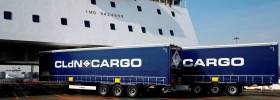Displaying items by tag: Big Ships Craze: Irish SeaUK
#BigShipCraze - The big ship craze appears to have spread to the short sea shipping industry serving the UK, after investment in the sector was frozen for the last few years.
However, speakers at this week's Multimodal 2016 event in Birmingham questioned whether there would be enough capacity on the medium term to serve the country’s freight needs.
Richard Horswill, Director of Freight for the UK and Ireland ferry operator Stena Line told delegates: “In the ferry industry we are still recovering from the financial crisis and recession, when volumes fell, which has meant that in the last few years, capacity and demand have become more balanced, but post-recession there has been a lack of investment in ships.”
However, he added that in the last few months, both Stena Line and Belgian ro-ro operator CldN have placed orders for new tonnage.
Stena Line has ordered four Ro-Pax ferries with 3,000 lane metres capacity each with a shipyard in China that are due for delivery in 2019 and 2020, while CldN, which operates the Cobelfret brand, has ordered two enormous ro-ro vessels with 8,000 lane metres-capacity, with an option for a further four.
“More capacity is coming in later, but the question is whether there will be enough capacity to meet market demand in the medium term,” Mr Horswill added.
He also said that whereas today’s ferries are bespoke built for particular routes, the newbuilds the Swedish company has ordered will be far more flexible in terms of trading areas.
“We will be building more ramps at the ports we use, so we can be more flexible about the ships and the way the fleet is deployed,” Mr Horswill said.
However, that trend has yet to be replicated in the lo-lo sector, said Mark Copsey, Chief Commercial Officer at MacAndrews, the UK short sea shipping specialist owned by the CMA CGM Group.
“In the lo-lo sector nobody is investing in new tonnage of the right size, so we are running with older tonnage in the short sea and feeder trades in Northern Europe.
“For the type of service we run, the 800-900 TEU size is the best dimension, but these vessels are also in demand in other markets and are being drained from this region,” he said.
However, fears of potential under capacity in the sectors might not be realised should legislative changes lead to a modal shift away from the sea to road transport.
Richard Newton, Commercial Director of Logistics at the Port of Tyne, said:
“We are very worried that with the forthcoming amendment to the SOLAS regulations with shippers forced to declare the verified gross mass (VGM) of containers, shippers won’t have their VGMs in time to load their boxes on ships, and this could lead them to look for other transport modes, such as road or trains, where they don’t have to declare this information.
“It’s clear that we might lose volumes to road due to this,” he said, adding that carriers themselves need to adopt a common VGM policy.
“Some shipping lines are saying they will have nothing to do with weighing, while others want the ports to do it – from a shipper’s point of view, there needs to be a consistent approach.”





























































